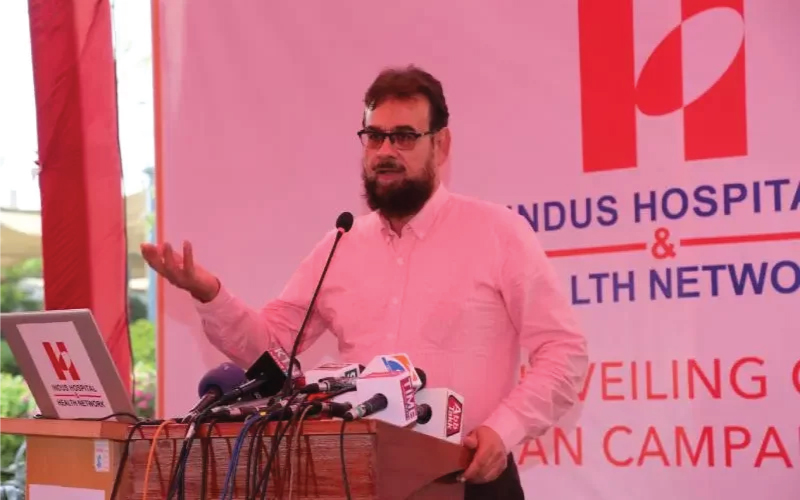IHHN Unveils its Ramazan Campaign 2022
Over a hundred guests gathered to witness the unveiling of the Indus Hospital & Health Network’s Ramazan Campaign 2022. The attendees included generous donors; media and government officials; senior management, academics, and staff of the Indus Hospital & Health Network (IHHN). The Ramazan Campaign 2022 aims at generating resources to continue running the most innovative healthcare network in Pakistan. The event took place at the Korangi Campus.
Salim Razzak Tabani, Chairman of the Fundraising Committee of the Board of Directors of IHHN, warmly welcomed the esteemed guests. He said, “Our vision and mission is to Please Allah Subhana wa Taa’la by ensuring free and quality healthcare accessible to the people across Pakistan. We are grateful for all the support we have received from the government and private partners, generous donors, corporates, media, youth volunteers, and ambassadors who have helped us in our journey. Today we are launching our Ramazan campaign and are reaching out to you all to once again help us in our mission by raising awareness about Indus and its initiatives.”
Syed Mashhood Rizvi, Executive Director, Communication and Resource Development, IHHN, presented an overview of Pakistan’s healthcare scenario and the supply and demand gap in the public health sector. He elaborated on how IHHN’s existence was the need of the hour and how Indus has created a nationwide healthcare system based on self-help, sincerity, and love for humanity. He also provided an overview of IHHN management and governance. He briefed the audience about the six international partners and how Indus is helping create a pool of highly skilled healthcare professionals through the Indus University of Health Science. He informed the audience that the new hospital building at the Korangi Campus will make the Korangi Campus, the largest private hospital with 1,350 beds.
He informed the audience of the grim statistics that were gripping the nation. On average, 40% of the Pakistani population (90m) earns PKR 3,900 per month, with PKR 3,000 spent on food, shelter, and clothing. The common man is left with only PKR 900 for healthcare and other expenses.
He also provided an overview of average healthcare charges in the country for different healthcare services, which are way beyond the earning capacity of the majority of the population. In this dire situation, Indus came as not only an alternative but as a ray of hope. Since its inception, there has been an increase of patient volume by 40%, with 450,000 patients benefitting from the services across the Network monthly.
As a whole, Indus has admitted 800,000 patients, had 14 million OPD visits, and conducted 16 million diagnostic tests. This includes more than 10,500 children treated for cancer; more than 15,000 orthotic and prosthetic devices provided; more than 100 children receiving Cochlear implants; more than 13,000 Diabetic patients benefited; and approximately 1,000 children are enrolled in the clubfoot program.
Mashhood Rizvi told the guests that, to date, Indus had spent PKR 43.20 billion on patient treatment in IHHN-owned hospitals. He informed the audience that it is amongst IHHN’s most ambitious philanthropic campaigns to raise PKR 14.1 million to treat the underserved and marginalized population of the country.
While elaborating on the Ramazan Campaign, Syed Mashhood Rizvi spoke of the power of philanthropy and the transformational vision of those who donate.
“IHHN solely relies on Zakat and donations,” he explained, “and for us, Ramazan is a time of great significance in terms of the collection of Zakat. We are running a campaign to reach out to many current and prospective donors, locally and internationally, so that they can consider IHHN as the main contender for their Zakat contribution. We are focusing the Ramazan campaign on generating donations for running the network of hospitals, Regional Blood Centers, Physical Rehabilitation Centers, and primary care clinics across Pakistan.”
He added that in the holy month of Ramazan, the Muslim Ummah looks for avenues to fulfill their religious obligation (Farz) of Zakat responsibly to reap the rewards in this world and the Hereafter. The fulfillment of this Farz by our supporters enables IHHN to fulfill its duty of providing free of charge-quality healthcare to millions of people and share the burden of healthcare provision by becoming the source of hope to the most under-served communities across Pakistan.
This idea has three aspects: IHHN is fulfilling its duty (fareeza) of serving the nation with free and quality healthcare. The donor can fulfill their duty (farz) of not only giving Zakat but giving it responsibly so that the impact of their Zakat can be optimized. IHHN rightfully deserves your Zakat because it will utilize Zakat responsibly to benefit countless deserving patients. Zakat brings relief to many families as their loved ones receive quality treatment without any financial burden. Your Zakat will bring multifold blessings in return as more than 70% of Zakat eligible patients will receive its numerous.
After the presentation, Mashhood Rizvi invited Dr. Abdul Bari Khan, Chief Executive Officer of the Indus Hospital & Health Network. He started with an introduction to the journey and trials that led to the inception of the Indus Hospital & Health Network. He credits his fellow philanthropists and dedicated colleagues that worked alongside him that made helped create the institute that answers patient’s prayers.
He concluded his speech with an address describing the limitations of the current hospital building and the reality that more needs to be done to address the ever-increasing patient load. He grew emotional as he described how Indus is the only health network in Pakistan that does not have a profit and thanked The Almighty for all the success Indus had seen, and that it has been able to make such an impact in Pakistan.
At the end of the ceremony, a mass prayer was held for the campaign’s success




